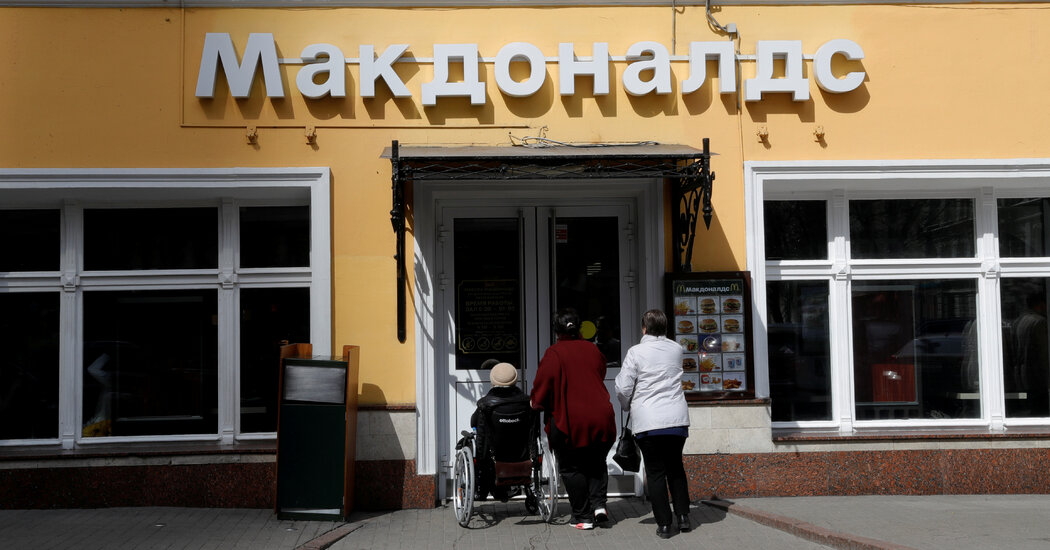President Biden on Tuesday announced a ban on Russian oil imports, a move economists say could have small but potentially meaningful domestic economic consequences, pushing gas pump prices higher at a time when inflation is rapidly spiraling. is.
“We are banning all imports of Russian oil, gas and energy,” Mr Biden said at a White House briefing on Tuesday. He said the plan would focus on the “main artery” of the Russian economy.
Russia produces about 12 percent of the world’s oil and 17 percent of its natural gas, according to JP Morgan estimates. Europe imports much more of its supply from Russia than the United States, but energy markets are global and the threat of a ban alone has sent commodity prices soaring in recent days.
“Prices in some markets, such as oil, already appear to be rising with a high probability of further sanctions,” Alec Phillips, an economist at Goldman Sachs, wrote in a research note. That would likely mitigate some of the additional consequences of further action, he wrote.
Economists have consistently noted that while an oil and gas ban will almost certainly drive inflation in the United States, the magnitude of the economic fallout would depend in large part on how it is structured. For example, it would probably make a big difference globally and in the financial markets whether the United States pursued the ban unilaterally or in consultation with European partners.
A ban in many countries “would seriously reduce and disrupt global energy supplies and increase already high commodity prices,” Caroline Bain, an economist at Capital Economics, wrote in a research paper, estimating the price of the global oil benchmark , Brent oil, would settle at about $160 a barrel, down from about $125 early Tuesday. “Energy prices would remain elevated for longer as it would take time for supply to pick up to fill the shortfall.”
There are signs that a ban may not be as comprehensive: The White House indicated this week that the United States could take separate action on blocking Russian oil imports, noting that countries in Europe are more dependent on Russian energy , something Mr Biden also mentioned Tuesday.
“Many of our European allies and partners may not be in a position to join us,” he said, adding that allies “remain united in our goal” to hurt Russia’s war effort. That includes the European Union’s efforts to reduce its dependence on Russian energy.
Britain stood on Tuesday ready to take its own steps to ban imports of Russian energy products. Kwasi Kwarteng, the country’s Minister of Affairs and Energy, said the would phase out Russian oil imports and oil products by the end of 2022.
The direct US economic impact of the loss of Russian oil is likely to be remarkable, albeit less severe than what would happen to Europe if it cut off Russian oil and gas flows. The United States imported less than 700,000 barrels of oil per day from Russia in 2021, according to the International Energy Agency. That’s less than 10 percent of what the United States imports worldwide.
Higher global oil and gas commodity prices and rising prices at the pump will add to the inflationary pain already haunting consumers. Prices are rising at the fastest pace in 40 years, and data from this week is expected to show the annual increase spiked higher in February.
Rising gas prices will exacerbate that trend. According to AAA, gas prices hit $4.17 Tuesday, a new high for regular unleaded gas.
“There will also be costs, here in the United States,” Mr Biden said. “Republicans and Democrats understand that.”
Gas prices of about $4.15 a gallon could push consumer price index inflation up half a percentage point in March, pushing it to a peak of 8 percent, Ian Shepherdson, an economist at Pantheon Economics, wrote in a recent note.
Higher gas prices are also weighing on consumer budgets, preventing them from spending on other things – so a ban could also affect overall economic growth.
But consumers are sitting on huge piles of cash amassed over the course of the pandemic, and because the United States produces gas domestically, higher prices could also encourage companies to invest and supply more in the United States.
“It is risky to assume that the old rule about higher prices depressing general economic growth in the US still applies,” Mr Shepherdson wrote.
High gas prices could be a liability for Democrats during a midterm election year as they hit voters right in the wallet. Republicans have already taken gas prices as a topic of conversation.
“Under Joe Biden, families are paying more for gas than ever before,” Republican National Committee chairman Ronna McDaniel said in a statement Tuesday.
But the White House emphasized that the price hikes are the result of the actions of President Vladimir V. Putin’ of Russia, and Mr. Biden pointed out that the United States and its partners are releasing global petroleum reserves.
The president also seemed willing to shift some of the blame onto businesses.
“To the oil and gas companies and to the financial firms – we understand that Putin’s war against the people of Ukraine is driving prices up, we understand that, that goes without saying,” he said. He added: “It is not an excuse to make excessive price increases or to make profits, or any kind of effort to exploit this situation or American consumers.”



